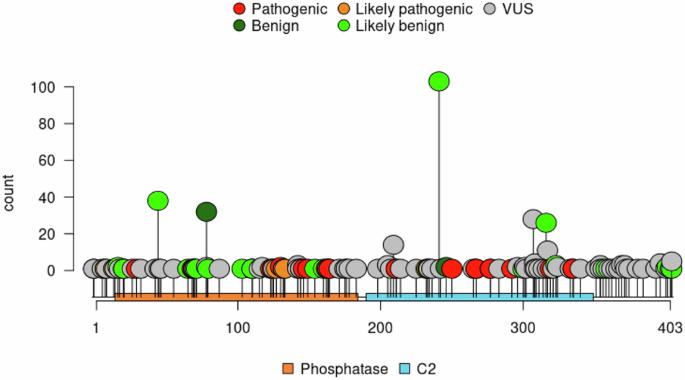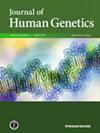日本人群中PTEN致病变异的癌症和疾病概况
IF 2.5
3区 生物学
Q2 GENETICS & HEREDITY
引用次数: 0
摘要
PTEN基因的种系改变导致一系列疾病,如PTEN错构瘤肿瘤综合征(PHTS),这种疾病显示出肿瘤发展的高风险和高度可变和复杂的表型。通过分子基因检测鉴定出一种杂合种系PTEN致病变异,在先证中建立了PHTS的诊断。在这项研究中,为了了解更多与PTEN相关的临床表型和PHTS在日本人群中,我们从日本生物银行(BBJ)登记的113,535名成年日本人中提取了128种生殖系PTEN罕见变异,并使用ClinVar分类和ACMG/AMP PTEN指南对30人(0.0264%)的29种致病/可能致病变异进行了分类。我们对75,238例不同类型癌症患者和38,297例非癌症对照进行了病例-对照研究,发现PTEN致病变异(pv)与子宫内膜癌(OR = 35.7, P = 9.73E-04)显著相关,与女性乳腺癌(OR = 19.5, P = 3.92E-03)轻微相关,尤其是在年轻发病和多发性癌症患者中。我们观察到,在127种疾病表型中,PTEN PV携带者有子宫肌瘤、甲状腺肿、卵巢囊肿和癫痫,这与PTEN相关表型一致。我们还发现,成年女性PTEN PV携带者的体重/身高明显较高(P = 3.1E-04和P = 0.0014),这与PHTS的过度生长综合征相一致。我们的研究结果表明,在日本人群中,尤其是女性,与PTEN pv相关的表型特征可以有助于筛选PTEN变异及其相关的几种表型。本文章由计算机程序翻译,如有差异,请以英文原文为准。

Cancer and disease profiles for PTEN pathogenic variants in Japanese population
A germline alteration in the PTEN gene causes a spectrum of disorders conceptualized as PTEN hamartoma tumor syndrome (PHTS), which show high risk of tumor development and a highly variable and complex phenotype. The diagnosis of PHTS is established in a proband by identification of a heterozygous germline PTEN pathogenic variant on molecular genetic testing. In this study, to understand more PTEN-associated clinical phenotype and PHTS in a Japanese population, we extracted 128 germline PTEN rare variants from 113,535 adult Japanese registered in Biobank Japan (BBJ), and categorized 29 pathogenic/likely pathogenic variants in 30 individuals (0.0264%) with ClinVar classifications and ACMG/AMP guideline for PTEN. We examined case-control association in 75,238 patients with various types of cancer and 38,297 non-cancer controls, and identified that PTEN pathogenic variants (PVs) were significantly associated with endometrial cancer (OR = 35.7, P = 9.73E-04) and marginally associated with female breast cancer (OR = 19.5, P = 3.92E-03), especially at young onset and with multiple cancers. We observed that among the 127 disease phenotypes the PTEN PV carriers had uterine fibroid, goiter, ovarian cyst, and epilepsy, which is consistent with PTEN-related phenotypes. We also found that weight/height were significantly higher in adult female carriers with PTEN PV (P = 3.1E-04 and P = 0.0014, respectively), which is consistent with overgrowth syndrome of PHTS. Our results indicate the phenotypical features associated with PTEN PVs in a Japanese population, especially female, and can contribute to the screening for PTEN variants and its associated several phenotypes.
求助全文
通过发布文献求助,成功后即可免费获取论文全文。
去求助
来源期刊

Journal of Human Genetics
生物-遗传学
CiteScore
7.20
自引率
0.00%
发文量
101
审稿时长
4-8 weeks
期刊介绍:
The Journal of Human Genetics is an international journal publishing articles on human genetics, including medical genetics and human genome analysis. It covers all aspects of human genetics, including molecular genetics, clinical genetics, behavioral genetics, immunogenetics, pharmacogenomics, population genetics, functional genomics, epigenetics, genetic counseling and gene therapy.
Articles on the following areas are especially welcome: genetic factors of monogenic and complex disorders, genome-wide association studies, genetic epidemiology, cancer genetics, personal genomics, genotype-phenotype relationships and genome diversity.
 求助内容:
求助内容: 应助结果提醒方式:
应助结果提醒方式:


